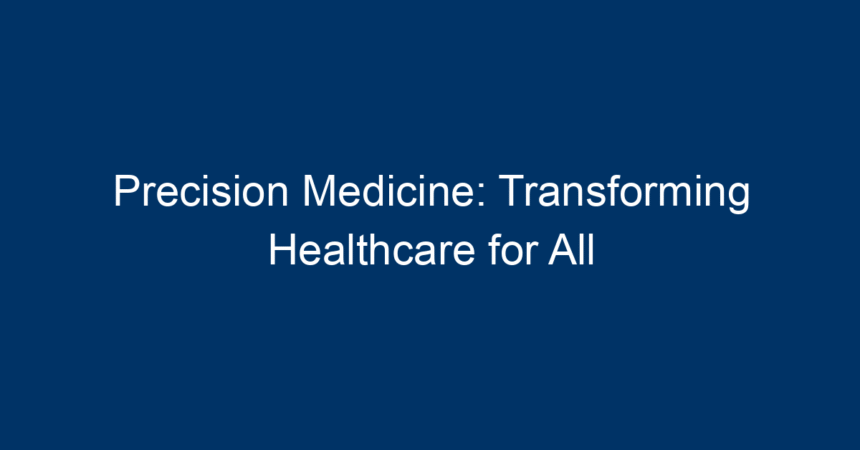In an era where healthcare advancements are rapidly unfolding, one revolutionary concept stands out: precision medicine. This innovative approach tailors medical treatment to individual characteristics, needs, and preferences. By leveraging data from genetics, lifestyle, and environment, precision medicine is not merely an evolution of traditional healthcare; it is a complete transformation. This article delves into the profound impact precision medicine has on healthcare, exploring its benefits, challenges, and future potential.
What is Precision Medicine?
Defining Precision Medicine
Precision medicine is a healthcare model that customizes medical treatment based on individual patient profiles. Unlike the conventional "one-size-fits-all" approach, it considers variations in genes, environments, and lifestyles when developing treatment plans. This personalization aims to improve outcomes, reduce side effects, and enhance patient satisfaction.
The Science Behind Precision Medicine
At its core, precision medicine revolves around genomics, the study of an individual’s DNA. The sequencing of genomes allows healthcare providers to identify specific mutations or genetic predispositions associated with various diseases. Coupled with advancements in big data and artificial intelligence, healthcare providers can analyze vast amounts of data to discern patterns, ultimately leading to more individualized care.
The Role of Genetics in Precision Medicine
Genetic Testing and Screening
Genetic testing plays a crucial role in precision medicine, enabling early detection and prevention of diseases. By screening for hereditary conditions and identifying risk factors, patients can make informed decisions about their health. For example, individuals with a family history of breast cancer may opt for BRCA gene testing to understand their risk and consider preventive measures.
Understanding Pharmacogenomics
Pharmacogenomics, the study of how genes affect a person’s response to drugs, is another vital component. By analyzing a patient’s genetic makeup, healthcare providers can prescribe medications that are more effective and have fewer side effects. This approach not only enhances the efficacy of treatments but also fosters a greater degree of patient adherence.
Benefits of Precision Medicine
Improved Treatment Outcomes
One of the most significant advantages of precision medicine is its ability to improve treatment outcomes. By tailoring therapies to the individual, healthcare providers can enhance the efficacy of interventions. Patients who receive precision medicine treatments often experience quicker recoveries and better management of chronic conditions.
Reduced Adverse Drug Reactions
Adverse drug reactions (ADRs) are a substantial challenge in healthcare. Precision medicine minimizes this risk by considering genetic factors that influence drug metabolism and efficacy. As a result, healthcare providers can prescribe medications more safely and effectively, leading to improved patient safety.
Cost-Effectiveness
Though the initial investment in precision medicine may seem high, it can lead to long-term cost savings. By focusing on prevention and more effective treatments, healthcare systems can reduce the need for expensive interventions that arise from complications or ineffective therapies. This proactive approach not only benefits patients financially but also eases the burden on healthcare systems.
Challenges in Implementing Precision Medicine
Data Privacy and Security Concerns
With the rise of precision medicine comes the need for vast data collection, raising privacy and security concerns. Striking a balance between utilizing patient data for innovation and protecting individual privacy is crucial. Ensuring robust cybersecurity measures and establishing clear guidelines is imperative for instilling patient trust.
Access and Equity Issues
As precision medicine becomes more mainstream, disparities in access to these advancements may emerge. Socioeconomic factors, geographical barriers, and differences in health insurance coverage can create inequities in healthcare. Addressing these challenges is vital to ensure that the benefits of precision medicine reach all populations.
Integration with Traditional Healthcare Models
Integrating precision medicine into existing healthcare frameworks requires a significant cultural shift within the medical community. Healthcare professionals must be educated and trained in this new approach, necessitating modifications in medical curricula and ongoing professional development.
Future Trends in Precision Medicine
Advances in Technology and Artificial Intelligence
The future of precision medicine is inextricably linked to technological advancements. Innovations such as machine learning and artificial intelligence will continue to play a vital role in analyzing complex datasets. As these technologies evolve, the potential for more accurate and efficient diagnostics and treatment plans will expand.
Growth of Precision Public Health
Precision medicine is poised to influence public health significantly. By applying precision techniques to population health, healthcare providers can identify vulnerable groups and tailor interventions accordingly. This approach could lead to more effective public health strategies and improved health outcomes at the community level.
Expansion of Collaborative Research
Collaboration among researchers, healthcare providers, and technology companies is essential for the growth of precision medicine. By sharing data and insights, stakeholders can accelerate the development of personalized treatments and therapies. Collaborative platforms and consortia will play a pivotal role in fostering innovation and enhancing care.
Actionable Insights: Embracing Precision Medicine
For Patients
- Stay Informed: Educate yourself about precision medicine and its potential benefits. Consult with healthcare providers about genetic testing options and how they may apply to your health.
- Advocate for Your Health: Engage with your healthcare team to discuss personalized treatment options. Do not hesitate to ask questions and express your preferences.
- Participate in Clinical Trials: Consider enrolling in clinical trials focusing on precision medicine. Your participation can contribute to advancing medical knowledge and improving treatment options for future patients.
For Healthcare Institutions
- Invest in Training: Provide staff with training on precision medicine principles. This education can help integrate personalized care into everyday practices.
- Embrace Technology: Invest in technological solutions that facilitate data analysis and enhance patient care. Implementing electronic health records that capture genetic and lifestyle data is crucial.
- Promote Collaborative Research: Foster partnerships with academic institutions and research organizations. Collaborating on studies related to precision medicine can accelerate advancements in treatment options.
For Policymakers
- Ensure Equitable Access: Develop policies that promote equitable access to precision medicine for diverse populations. Addressing healthcare disparities is essential for maximizing the benefits of this approach.
- Prioritize Data Security: Establish regulations that protect patient data privacy while incentivizing technological innovation in precision medicine.
Conclusion
Precision medicine is a transformative force in healthcare, offering a pathway to more effective, personalized treatments. As we embrace this innovative approach, it is essential to navigate the challenges and opportunities it presents. By fostering collaboration among patients, healthcare providers, and policymakers, we can ensure that the promise of precision medicine translates into actionable benefits for all, paving the way for a healthier future. The journey has just begun, and everyone has a role to play in its evolution.




